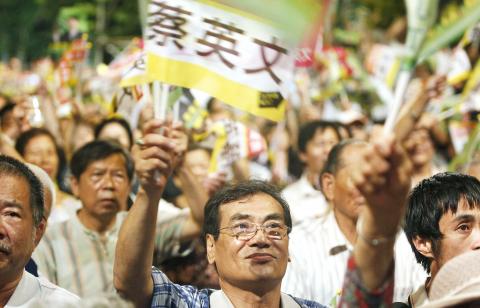|
ANALYSIS: China nervously watching
election campaign
By Ben Blanchard / Reuters, BEIJING, with Staff Writer

Democratic Progressive Party
supporters wave flags during an election campaign in Changhua on Wednesday.
China is steeling itself for another presidential election in Taiwan, hoping a
victory for the Chinese Nationalist Party (KMT) enables even better ties, but
also girding for an opposition win that may inflame tensions.
Photo: Pichi Chuang, Reuters
China is steeling itself for another
presidential election in Taiwan, hoping a victory for the Chinese Nationalist
Party (KMT) enables even better ties but also girding for an opposition win
that, according to some, could inflame tensions.
Beijing has never been comfortable with elections on Taiwan and has warned any
attempt to set up an independent “Republic of Taiwan” would end in armed
conflict.
Even so, political relations have improved since the election of President Ma
Ying-jeou (馬英九).
Beijing has been more willing to work with Ma than with his predecessor, former
president Chen Shui-bian (陳水扁) of the Democratic Progressive Party (DPP).
“They’re very concerned about this upcoming election,” said Dafydd Fell, senior
lecturer in Taiwan Studies at the School of Oriental and African Studies in
London, of Chinese leaders.
“Even when the DPP was at its lowest point, when I was talking to Taiwan people
in China, they were still very worried at the prospect of the DPP coming back to
power,” he said.
Chen was jailed for corruption after stepping down from power. However, the DPP
has bounced back from that scandal and has put up steely, US and
British-educated DPP Chairperson Tsai Ing-wen (蔡英文) to face Ma in January.
Chinese leaders will be hoping desperately that Ma gets back into office and
continues a rapprochement that thus far has focused on economic issues but which
China will eventually want to cover much harder and more sensitive political
matters.
China vented its anger at Washington rather than Taipei after the announcement
of US arms sales to Taiwan last month because it understood that rhetoric
directed at Taiwan could play into the DPP’s hands and lessen the chances of Ma
getting back into office, Beijing-based diplomats say.
The day before Washington unveiled the package, former KMT chairman Lien Chan
(連戰) was greeted warmly in Shanghai, home to many Taiwanese companies and about
300,000 Taiwanese expatriates.
Lien lauded the Economic Cooperation Framework Agreement (ECFA) deal signed last
year.
“It is clear to all that this agreement has promoted cross-strait exchanges and
Taiwan’s economic development,” the Taiwan Affairs Office quoted Lien as telling
Shanghai’s Chinese Communist Party chief Yu Zhengsheng (俞正聲).
China will have to tread carefully, however. Previous attempts to influence
Taiwan elections have backfired.
In 1996, then-Chinese president Jiang Zemin (江澤民) ordered fire missiles tests
and war games in the seas around Taiwan to try and intimidate voters not to back
then-president Lee Teng-hui (李登輝), who China believed was moving Taiwan closer
to formal independence.
Lee won by a landslide.
China has made little attempt to hide its suspicions of Tsai.
In May, the People’s Daily accused Tsai of flip-flopping on China policy and
still ultimately wanting to push Taiwan’s independence.
Earlier this month in Greater Kaohsiung, Tsai said Taiwan and the Republic of
China (ROC) were the same thing, signaling for some a softer line on Taiwan’s
status.
She had previously referred to the ROC as an illegitimate, foreign government.
China was not convinced.
“This is obfuscation, a backdoor way of supporting Taiwan independence,” Taiwan
Affairs Office spokesman Yang Yi (楊毅) said of Tsai’s remarks.
The DPP would not likely rule out contact with China if elected, Tsai campaign
manager Hsiao Bi-khim (蕭美琴) said, but added: “We don’t expect the Chinese to
respond to us positively.”
China has not closed the door to dealing with the DPP though.
“They are betting on both sides. If Ma is going to win re-election, they will be
happy. If the DPP’s Tsai Ing-wen is going to win, they will have preparations
for that outcome as well,” said Bo Zhiyue (薄智躍), political scientist at the
National University of Singapore’s East Asian Institute.
“If the DPP wins, while China may be dissatisfied or displeased, it will not
cancel groups or suspend direct flights in the beginning,” said Edwaid Chen
(陳一新), professor at the Graduate Institute of the Americas at Tamkang
University.
“Instead, it will send congratulations to Tsai Ing-wen first and take a
wait-and-see approach,” Chen said.
|
![]()
![]()
![]()